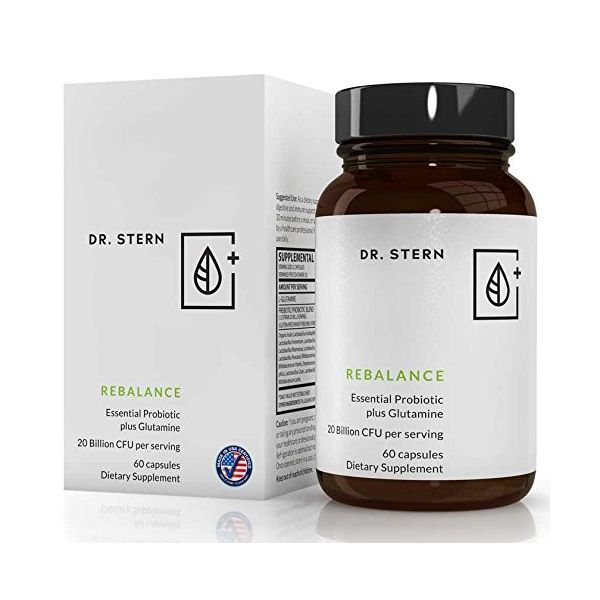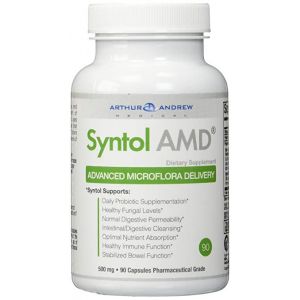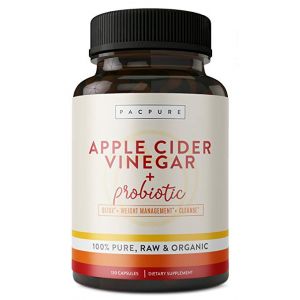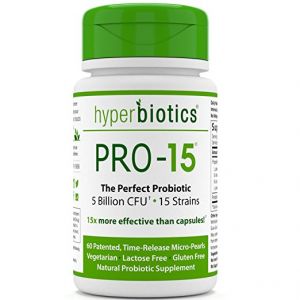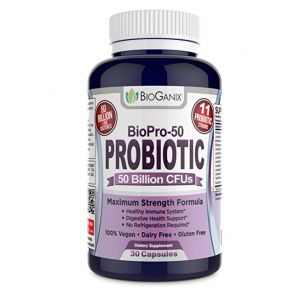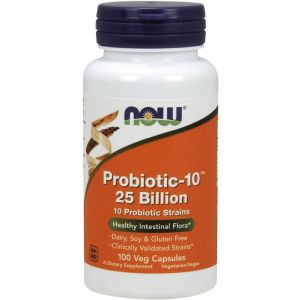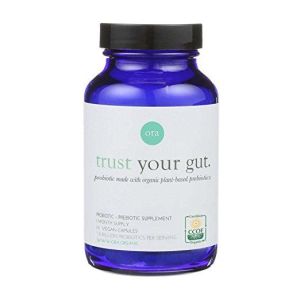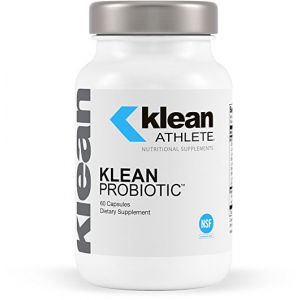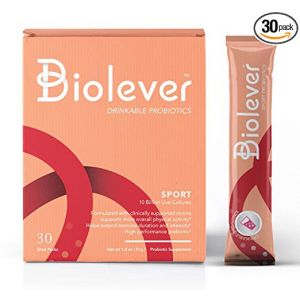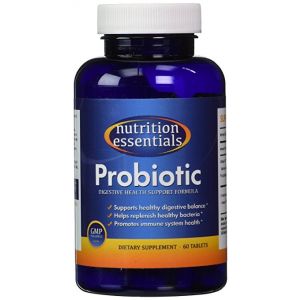- Pros:
- Essential probiotic blend enriched with organic prebiotics and L-Glutamine for optimal gut health and nutrient absorption
- Provides 12 bacterial strains that supply 20 billion CFUs per serving
- Clinically-proven probiotics
- Helps improve gut absorption and leakage issues
- Enhances the body's ability to repair the intestinal lining
- Each batch is individually tested for ingredient purity
- BSCG Certified drug free
- BSCG is the gold standard of supplement testing
- BSCG certification is trusted by Olympic and professional athletes
- GMP compliant product
- Made in the USA
- Non-GMO
- Free of additives, fillers, gluten, corn, dairy
Ingredients Concern: None discovered
Cons: If you are pregnant, nursing, diabetic, or taking any prescription drugs, please consult your healthcare professional prior to use, Refrigeration is optimal but not necessary, Once opened, store in a cool, dry place, Keep out of reach of children
Probiotics have been shown to improve allergic reactions and skin allergies in children [5], most of which are linked to the environmental exposure to allergens such as dust mites, dog or cat hair, and pollen.
Furthermore, taking probiotics during pregnancy and adding probiotics to the diet of newborns helps target inherited skin problems [6]. In addition, the protection that probiotics provides for skin cells persists for years when the supplementation begins during infancy [7].
Probiotic supplementation is also associated with a reduced incidence of duration of diarrhea that is due to antibiotic use [8]. In addition, probiotics are frequently administered in hospital settings to target diarrhea that is caused by antibiotics [9]. In NICUs, probiotic supplementation is also used to boost health and target diarrhea in newborns [10].
Research shows that taking a minimum of 5 billion CFUs of probiotics daily promotes health in children, they can be taken safely on a regular basis, they do not typically interact with any medication, and they rarely cause adverse effects [5]. Research indicates that the daily serving of probiotics which supports optimal digestive and immune system function for adults is 10 billion CFUs [1, 5]. In addition, probiotics support healthy cholesterol, triglyceride, and liver fat levels, thereby promoting a healthier metabolism [18]. They also help improve the body's ability to degrade cholesterol which enhances weight control [18, 19].Prebiotics provide nutrients that enhance the growth and activity of the probiotics [4]. Probiotics help target digestive issues that are related to a damaged intestinal lining and the leakage of different substances in the gut [20]. L-glutamine is a described as an essential amino acid, depending on the biological process for which it is needed, and although it influences numerous processes (e.g., immunity, antioxidant activity), it is well-known for its influence on wound healing [21, 22]. Research shows that fibroblast use L-glutamine as an energy source to promote new cell growth [21]. Fibroblasts support the production of collagen in cells throughout the body and they play a primary role in wound healing [21, 22].
Heightened digestive function; Improved nutrient absorption; Immune support [1-10]
Probiotics restore and maintain a healthy balance of good bacteria in the gut [1]. Probiotics also release enzymes that promote the digestion of food and enzymes that target bad bacteria as well as other harmful invaders, thereby improving overall digestive function [11]. In addition, they support the proper breakdown and transport of nutrients into the bloodstream and throughout the body [4]. By improving the digestive process, probiotics helps ensure that only low amounts of undigested food remain in the gut as undigested food often leads to stomach discomfort. In doing so, probiotics target bloating, constipation, gas, and diarrhea, especially when antibiotics are being taken [8].Probiotic supplementation is frequently recommended during and after antibiotic use because it restores healthy levels of good bacteria [9].
Probiotics boost natural antioxidant activity in the body and this takes some of the strain off of the immune system [12]. Therefore, immune system becomes stronger and more readily available to target foreign invaders due to added protection that is provided by probiotics.
Probiotic supplementation during childhood enhances digestive health and immunity [5]. More specifically, young children who take probiotics have a less exaggerated immune response to allergens that may otherwise cause them to become hyper-allergic [13]. Furthermore, probiotics help disrupt an imbalance of pro-inflammatory and anti-inflammatory proteins [2].
In addition, probiotics play a protective role against common allergens due to their ability to improve the viscosity of the natural mucus lining in the airways that trap and excrete allergens [1]. This reduces reactions to allergens, including skin allergy reactions [5]. Probiotic supplementation in young children also disrupts harmful invaders from causing infections in the respiratory system because probiotics support increased levels of white blood cells and natural killer cells [14, 15]. Furthermore, probiotics release specific substances that have antimicrobial activity and this enhances immunity, respiratory health, and overall health [14, 16, 17].
Furthermore, clinical research indicates that probiotics support heart health and weight control by promoting the breakdown of cholesterol, triglycerides, and body fat in obese individuals and influencing the way cholesterol is absorbed in the gut [18, 19].
When an individual experiences a leaky gut it means that the protective lining of the stomach is broken down and inflammatory substances enter the blood stream where they can cause pain throughout the body. Probiotic supplementation helps promote the body's ability to repair and restore the protective lining and stomach function [20].
L-glutamine is a source of nutrients for fibroblasts, which are specialized cells that play a key role in wound healing by promoting collagen production in cells throughout the body, including at wound sites [21, 22]. In particular, L-glutamine strengthens the tissue in the wound site and increases the percentage of collagen in the affected area by enhancing fibroblast activity [21, 22].L-glutamine also plays a role in various processes that include immune responses, antioxidant activity, and the regulation of T-cells (immune system cells) [22].
Key Ingredients: L-Glutamine - 1 g, Prebiotic/Probiotic Blend - 334 mg: Organic inulin, Lactobacillus Acidophilus, Lactobacillus Fermentum, Lactobacillus Plantarum, Lactobacillus Rhamnosus, Lactobacillus Salivarius, Lactobacillus Paracasei, Bifidobacterium Bifidum, Bifidobacterium Infantis, Streptococcus Thermophilus, Lactobacillus Casei, Lactobacillus Bulgaricus, Bifidobacterium Lacti
All Ingredients: L-Glutamine - 1 g, Prebiotic/Probiotic Blend - 334 mg: Organic inulin, Lactobacillus Acidophilus, Lactobacillus Fermentum, Lactobacillus Plantarum, Lactobacillus Rhamnosus, Lactobacillus Salivarius, Lactobacillus Paracasei, Bifidobacterium Bifidum, Bifidobacterium Infantis, Streptococcus Thermophilus, Lactobacillus Casei, Lactobacillus Bulgaricus, Bifidobacterium Lactis, Vegetbale (HPMC) capsule
As a dietary supplement for digestive and immune support, take 2 capsules 30 minutes before a meal, or as recommended by a healthcare professional. For best results, use daily.
These statements have not been evaluated by the FDA. These products are not intended to diagnose, treat, cure or prevent any disease.
1. Kechagia M, Basoulis D, et al. Health benefits of probiotics: a review. ISRN Nutr. 2013;2013:481651.
2. Doron S, Snydman DR, Gorbach SL. Lactobacillus GG: bacteriology and clinical applications. Gastroenterol Clin North Am. 2005;34(3):483-498.
3. Rask C, Adlerberth I, Berggren A, Ahren IL, Wold AE. Differential effect on cell-mediated immunity in human volunteers after intake of different lactobacilli. Clin Exp Immunol. 2013;172(2):321-332.
4. Sheridan PO, Bindels LB, et al. Can prebiotics and probiotics improve therapeutic outcomes for undernourished individuals? Gut Microbes. 2014; 5(1):74-82.
5. Kliglerr B, Cohrssen A. Probiotics. Am Fam Physician. 2008, 78(9):1073-1078.
6. Kalliomäki M, Salminen S, Arvilommi H, Kero P, Koskinen P, Isolauri E. Probiotics in primary disruption of atopic disease: a randomised placebo-controlled trial. Lancet. 2001;357(9262):1076-1079.
7. Kukkonen K, Savilahti E, Haahtela T, et al. Probiotics and prebiotic galacto-oligosaccharides in the disruption of allergic diseases: a randomized, double-blind, placebo-controlled trial. J Allergy Clin Immunol. 2007;119(1):192-198.
8. Hempel S, Newberry SJ, Maher AR, et al. Probiotics for the disruption and treatment of antibiotic-associated diarrhea: a systematic review and meta-analysis. JAMA. 2012;307(18):1959-1969.
9. Ouwehand AC, DongLian C, Weijian X, et al. Probiotics reduce symptoms of antibiotic use in a hospital setting: a randomized dose response study. Vaccine. 2014;32(4):458-463.
10. Deshpande GC, Rao SC, Keil AD, Patole SK. Evidence-based guidelines for use of probiotics in preterm neonates. BMC Med. 2011;9:92.
11. Manzoni P, Mostert M, Leonessa ML, et al. Oral supplementation with Lactobacillus casei subspecies rhamnosus disrupts enteric colonization by Candida species in preterm neonates: a randomized study. Clin Infect Dis. 2006;42(12):1735-1742.
12. Gomes AC, de Sousa RG, Botelho PB, Gomes TL, Prada PO, Mota JF. The additional effects of a probiotic mix on abdominal adiposity and antioxidant Status: A double-blind, randomized trial. Obesity (Silver Spring, Md). 2017, 25(1):30-38.
13. Prescott SL, Dunstan JA, Hale J, et al. Clinical effects of probiotics are associated with increased interferon-gamma responses in very young children with atopic dermatitis. Clin Exp Allergy. 2005, 35(12):1557-1564.
14. Wang Y, Li X, et al. Probiotics for disruption and treatment of respiratory tract infections in children: A systematic review and meta-analysis of randomized controlled trials. Medicine (Baltimore). 2016;95(31):e4509.
15. Guillemard E, Tanguy J, Flavigny A, et al. Effects of consumption of a fermented dairy product containing the probiotic Lactobacillus casei DN-114 001 on common respiratory and gastrointestinal infections in shift workers in a randomized controlled trial. J Am Coll Nutr 2010; 29:455-468.
16. Fooks LJ, Gibson GR. Probiotics as modulators of the gut flora. Br J Nutr. 2002;88 suppl 1:S39-S49.
17. Szajewska H, Konarska Z, Kolodziej M. Probiotic bacterial and fungal strains: claims with evidence. Dig Dis. 2016;34:251-259.
18. Costabile A, Buttarazzi I, Kolida S, et al. An in vivo assessment of the cholesterol-lowering efficacy of Lactobacillus plantarum ECGC 13110402 in normal to mildly hypercholesterolaemic adults. PloS one. 2017, 12(12):e0187964.
19. Famouri F, Shariat Z, Hashemipour M, Keikha M, Kelishadi R. Effects of Probiotics on Nonalcoholic Fatty Liver Disease in Obese Children and Adolescents. J Pediatr Gastroenterol Nutr. 2017, 64(3):413-417. 20. Gorbach SL. Probiotics and gastrointestinal health. Am J Gastroenterol 2000;95:S2-S4.
21. Sipahi S, Gungor O, et al. The effect of oral supplementation with a combination of beta-hydroxy-beta-methylbutyrate, arginine and glutamine on wound healing: a retrospective analysis of diabetic haemodialysis patients. BMC Nephrol. 2013;14:8.
22. Miller AL. Therapeutic considerations of L-glutamine: a review of the literature. Altern Med Rev. 1999;4(4):239-48.

